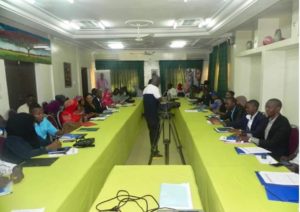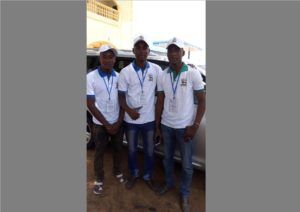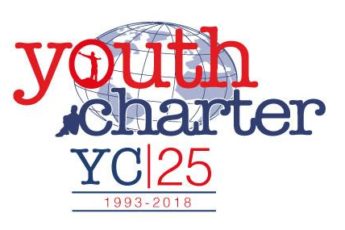
Adam May is a peace volunteer who is pursuing his Masters at the University of Diffa in Niger. Although I have not been there, I fell in love with the country through the words he used to describe Diffa’s region. Since the 1980s, when the Lake Chad faced severe droughts, the region with admirable natural beauty has been affected by hunger, lack of healthcare and limited acces to education. Within this context, the extremist group Boko Haram (whose name means ”Western education is forbidden”) have found fertile terrain to spread its ideology.
In 2015 the group led a simultaneous raid into the city of Diffa (Niger) and Bosso (border town with Nigeria) and Adam started questioning himself:
Why do young people turn into violent extremism? What do they earn? Is it because of religion?
He, then, decided to join the university’s efforts to tackle radicalisation in Lake Chad basin, especially among youth.
We had several activities in collaboration with the Peace and Development Unit of the University of Diffa, High Authority for the Consolidation of Peace of the Government of the Republic of Niger and the National Commission of Human Rights. I can mention, for example: three international symposiums on peace in the countries of the Lake Chad basin organised by the University of Diffa, we carry out activities to raise awareness on violent extremism with young people, and we also organise cultural and sports activities in collaboration with NGOs
According to Adam the biggest barriers he faces on a daily basis in his volunteering work are the lack of transport and the lack of funding, turning it very difficult to discuss issues regarding extremism with a higher number of individuals. He believes youth can play a key role on radicalisation prevention, especially because although Boko Haram has been hiding since 2009, it keeps recruiting young people who live in the poorest regions, mainly out-of-school youngsters. He mentions a sentence addressed by the former secretary-general of the United Nations, Ban Ki Moon, to underscore the importance of youth:
Young people represent the hope
As an attempt to expand the reach of his messages, he has developed several campaigns and promoted direct discussions. Moreover, he has also contributed with university’s efforts to draw international attention to the situation in Niger. An example of it was the International Symposium on de-radicalization and rehabilitation of repentant of Boko Haram held in 2017.
THE SITUATION IN NIGER
Adam explains the situation in Niger is far from resolved. He gives the example of a recent terrorist attack on March 2018 against a military base based in just 50 km away from the capital. He believes poverty is one of the main reasons that drive youth to this path. According to him it is very difficult to quantify the number of people who have been recruited by Boko Haram:
It is very difficult to estimate the numbers of people recruited by the terrorist organization Boko Haram because of the complexity of the area, so it is necessary to know that Boko Haram recruits fighters in Niger, Chad, Cameroon and in Nigeria
Bosso, Karamga and other villages located in the Diffa region have been facing murdering, kidnapping, and more violence after the arrival of Boko Haram in places nearby as many people migrated from there to Diffa’s region. In the short-time, Adam don’t envisage a solution to this problem, but in the long-term he has no doubts that change only will be possible with authorities working together with young people to build a fairer society.
Youth can change the world because young people are the engine of development. Personally, I think the word peace means ‘social justice’. Because, in order to reach a lasting peace in this world, in the first place – we must banish injustice, impunity, and discrimination
By Petya Hristova (University of Westminster / UK)





